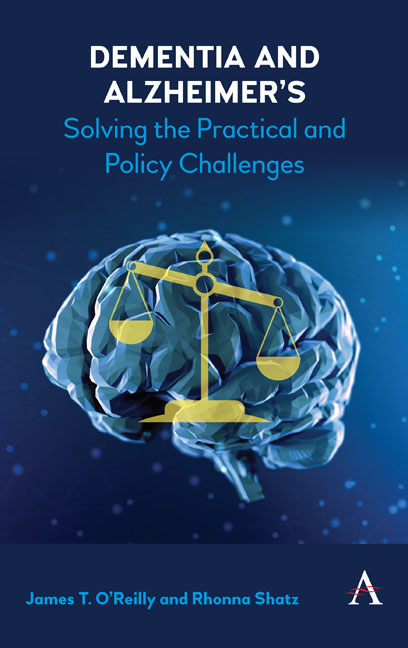Book contents
- Frontmatter
- Contents
- 1 Introduction
- 2 The family dynamics of dementia
- 3 Tort liability related to dementia
- 4 Dementia and private insurance
- 5 Medicare, Medicaid, disability and other government benefits
- 6 Dementia and residential care facilities
- 7 Adult protective services in dementia cases
- 8 Dementia and financial issues
- 9 Dementia in probate and guardianship
- 10 Dementia and employment issues
- 11 Drug research and new product developments for dementia
- 12 Dementia and criminal justice
- 13 Understanding your expert's advice about brain deterioration
- 14 Understanding the causes of Alzheimer's disease
- Appendix: Finding medical reference sources about dementia
- Index
1 - Introduction
- Frontmatter
- Contents
- 1 Introduction
- 2 The family dynamics of dementia
- 3 Tort liability related to dementia
- 4 Dementia and private insurance
- 5 Medicare, Medicaid, disability and other government benefits
- 6 Dementia and residential care facilities
- 7 Adult protective services in dementia cases
- 8 Dementia and financial issues
- 9 Dementia in probate and guardianship
- 10 Dementia and employment issues
- 11 Drug research and new product developments for dementia
- 12 Dementia and criminal justice
- 13 Understanding your expert's advice about brain deterioration
- 14 Understanding the causes of Alzheimer's disease
- Appendix: Finding medical reference sources about dementia
- Index
Summary
Looking inside the brain
The brain is a wonderfully complex system. Its secrets are hidden until death, when an autopsy can help to retrospectively explain some of the unusual behaviors which had been loosely grouped together by doctors with a diagnosis of “dementia.” Dementia is a broad term for brain disease, a term that includes multiple stages of severity within a chronic disease of cognitive impairment. Alzheimer's is one of the best-known subcategories, among the several forms of dementia, but the subcategories have surprising characteristics and variations.
The key problem that counselors face with diagnosing the medical and psychological problem of an individual has been expressed as “you don't know what you don't know” regarding a patient's brain and its deterioration over time. Until the autopsy is done, we cannot accurately answer all the questions about how dementia has been actually impacting on the brain of this patient. Those counselors and attorneys who want certainty in every case, or a clear winner every time, should not accept roles in which dementia is a factor for that individual or, more frequently, a factor against the defendant driver, midnight shoplifter or agitated homeless person wandering in a city park.
How big the issues are, and will be
Counselors who wish to succeed with claims need to understand the large and growing wave of dementia illness, which is emerging from demographic trends and especially from older aging Americans, a product of relatively healthier living among younger and middle-aged persons.
Yes, there will be a market, especially for legal services. There are estimates of between 3.8 million and 5.3 million adults with dementia in the United States today, projected to grow to approximately 12 million to 15 million by 2050 as “baby boomers” move through the system. Their caregivers, family members and heirs total in the millions as well.
Three of the relevant systems to be addressed in this text, the US legal system, the for-profit and voluntary long-term care system, and the caregiver/medical personnel system, are not well equipped to deal with the imminent and massive volume increase among the post–World War II youth who are today's elder patients. Advising this market is a challenge, but it needs to be satisfactorily completed.
- Type
- Chapter
- Information
- Dementia and Alzheimer'sSolving the Practical and Policy Challenges, pp. 1 - 4Publisher: Anthem PressPrint publication year: 2019



